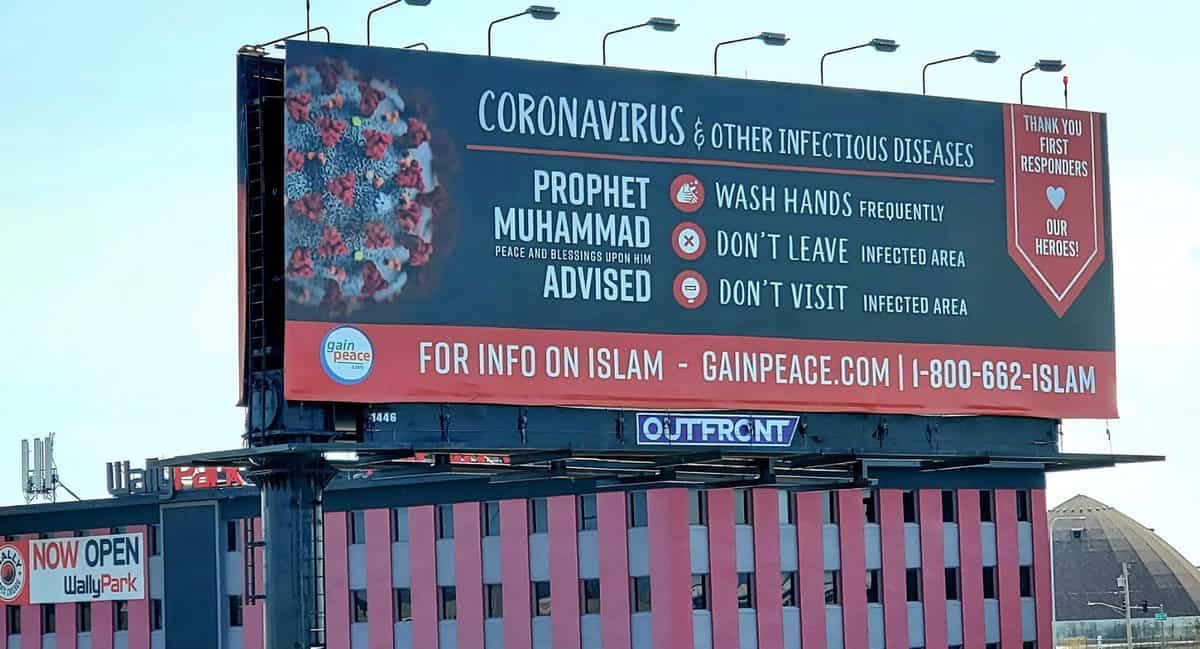Gain Peace has erected a billboard in Chicago advising locals to use age-old advice of Prophet of Islam Muhammad (peace and blessings be upon him) to prevent the spread of the novel coronavirus.
The advertisement outlines how the Prophet of Islam (peace and blessings be upon him) historically dealt with pandemics during his time, all of which are guidelines set by world health organisations to deal with the current Covid-19 outbreak.
The bill board states “Prophet Muhammad (peace and blessings upon him) advised: “Wash hands frequently, don’t leave infected area, don’t visit infected area.”
Since the current outbreak began to spread across the world the guidelines based on hadeeth of prophet (peace and blessings be upon him) have been widely shared across social media platforms.
The centuries-old advices of Prophet Muhammad (peace be upon him) have resonated with millions of people.
Governments across the world – from the US to Iran – issued instructions now to stop the spread of coronavirus which appear to mirror the advice of the Prophet (peace be upon him) and seem relevant for the modern-day.
Prophet Muhammad’s (peace and blessings be upon him) teachings regarding pandemics:
Travel bans and quarantine
More than 1400 years ago Prophet Muhammad (peace and blessings be upon him) had recognised and preached the importance of travel bans and quarantine in places contaminated with disease in order to contain the spread of disease. He said, “If you hear of an outbreak of plague in a land, do not enter it; and if the plague breaks out in a place while you are in it, do not leave that place.” (Sahih al-Bukhari)
Social distancing and isolation
The practice of social distancing during Prophet’s (peace and blessings be upon him) time is evident with this incident: “It is reported that a leprous man once wished to pledge his allegiance to him, an act that would require him to touch or hold the Holy Prophet’s hand. Keeping his distance, the Holy Prophet (peace and blessings be upon him) kindly sent word to him that his pledge had already been accepted and that he should return home.” (Sunan Ibn Majah)
Teaching isolation, the Holy Prophet (peace and blessings be upon him) said: “The cattle suffering from a disease should not be mixed with healthy cattle.” (Sahih al-Bukhari)
Hazrat Umar, the rightly guided khalifa (May Allah be pleased with him), once encouraged a leprous woman who was circling the Holy Ka‘bah in Makkah to go back to her home as it would be better for her (and others). After Hazrat Umar’s demise, a man told her that the one who forbade her had passed away so she could go and circle the Ka‘bah as she pleased. She replied, “I am not going to obey him when he is alive and disobey him when he has passed away.” Indeed, this is a beautiful example that reflects the spiritual power and impact of the Holy Prophet (peace and blessings be upon him) and his rightly guided Khulafa.
Hygiene
Cleanliness and hygienic practices are the hallmark of Islam. A hadeeth says “Cleanliness is half of the faith.” Muslims perform ablution (ritual cleaning from head to toe with clean water) before each of the five daily prayers.
According to a hadeeth, the Holy Prophet (peace and blessings be upon him) would cover his face and muffle the sneeze, effectively containing the spread of airborne bacteria and viruses. (Jami‘ al-Tirmidhi)
Seeking medical treatment
The Holy Prophet (peace and blessings be upon him) encouraged people to seek medical assistance alongside relying on the power of prayer. He said: “Seek (medical) treatment, O Slaves of Allah, for Allah does not create any disease but He also creates with it the cure, except for old age.” (Sunan Ibn Majah)
On another occasion he said, “Every disease has a cure. If a cure is applied to the disease, it is relieved by the permission of Allah the Almighty”. (Sahih Muslim)


